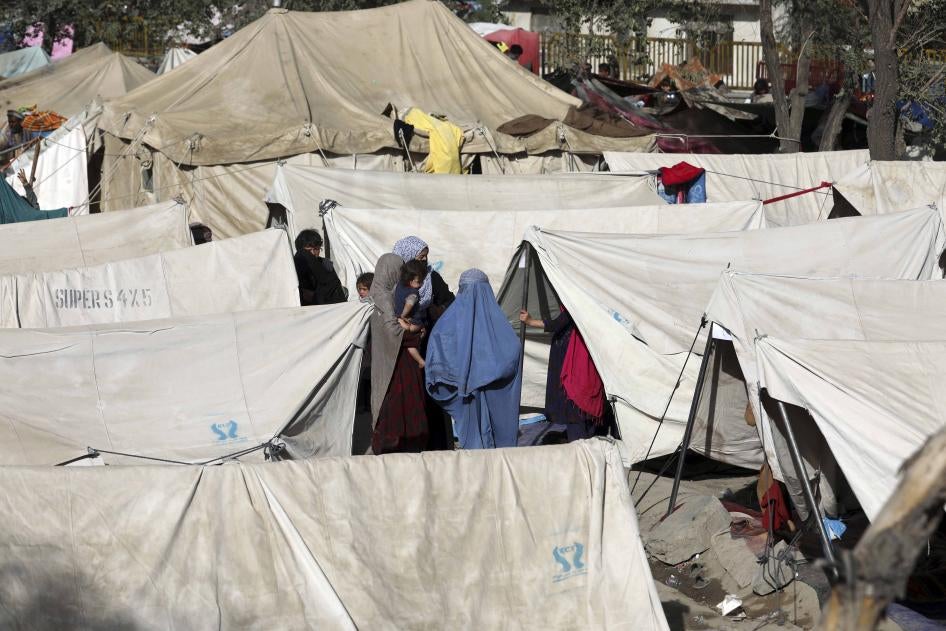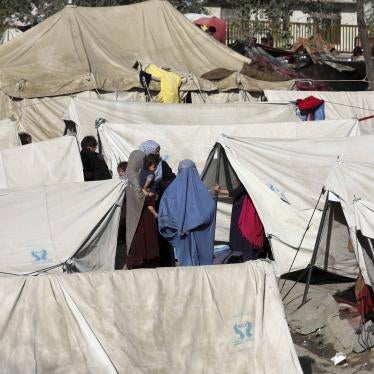As humanitarian needs in Afghanistan continue to escalate, we appeal to the EU to place protection at the centre of its response. We are disappointed by the absence of leadership at the Justice and Home Affairs Council on 31 August and Interior Ministers’ continued focus on preventing people from arriving in the EU, instead of providing pathways to protection. While the majority of Afghan refugees will seek safety in the region, the EU should be sharing, rather than shirking, the responsibility to offer them protection. Ahead of the Resettlement Forum currently planned for early October, we call on EU states to expand safe pathways for people in need of protection, including through an ambitious and additional resettlement programme for Afghan refugees and a flexible use of other available pathways to safety.
18 million people are now in urgent need of life-saving humanitarian assistance in Afghanistan – nearly half of the population. So far this year, over 630,000 people have been internally displaced due to violence and drought, while many people at immediate risk of persecution have been unable to leave the country. In addition to scaling up funding towards the humanitarian response, ensuring pathways to protection for the people of Afghanistan must also be Europe’s priority now.
In recent weeks, European citizens, cities and civil society have led the way in showing their solidarity with Afghan refugees and their willingness to host and welcome those in need. Several countries, too, have announced or called for ambitious resettlement places. By contrast, we regret the misleading and alarmist rhetoric expressed by some European leaders in the past weeks, which diverts attention from people’s acute protection needs, may raise barriers to refugees’ integration and inclusion in European societies, and stokes fears about a non-existent crisis at Europe’s borders. This is a crucial moment for the EU to live up to its commitments to refugee protection and humanitarian leadership. We call on the EU and EU member states to:
1 – Make concrete commitments towards a significantly expanded refugee resettlement scheme at the upcoming Resettlement Forum.
We welcome the Commission’s decision to host a Resettlement Forum in the coming weeks: this must now lead to concrete, ambitious pledges. Expanded resettlement would provide a lifeline for vulnerable refugees, display solidarity with host countries, and encourage strengthened protection in the region.
- The rapidly escalating protection needs demand an additional, swift and bespoke EU-wide scheme to resettle Afghan refugees from neighbouring states. Iran and Pakistan currently host nearly 90% of displaced Afghans – over two million registered refugees in total – and should not have to bear this responsibility alone. Pledges to resettle Afghan refugees should be commensurate to the gravity of the situation and in line with past emergency resettlement schemes. Given the likelihood of a protracted displacement situation, states should commit to multi-year resettlement pledges.
- At the same time, the escalating situation in Afghanistan cannot detract from resettlement efforts from other ongoing crises and displacement situations. We also reiterate our calls from July, urging European states to pledge to resettle at least 36,000 refugees in 2022, in line with UNHCR-identified priorities. These pledges were already greatly necessary before this new emergency, and a targeted resettlement scheme for vulnerable Afghan refugees must be additional to this commitment, to match the rapid increase in humanitarian needs.
- The newly approved Asylum, Migration and Integration Fund (AMIF) budget must act as an instrument to incentivise ambitious pledges. The European Commission should immediately make the agreed resources available to finance resettlement and humanitarian admissions in the new AMIF Regulation and develop the 2021 and 2022 AMIF work plans to account for additional needs.
- Resettlement pledges from the region must continue to take account of UNHCR submission criteria and prioritise the most vulnerable. While we greatly welcome the particular focus on women and girls, we note that the urgent protection needs among Afghans are not limited to this group alone. Resettlement should remain based on a protection assessment and UNHCR submission criteria, and target the most vulnerable refugees identified in refugee-hosting countries, while ensuring respect for family unity. Indications that governments want to include Afghan or EU nationals that have been evacuated from Afghanistan within their 2021 annual quota commitments are concerning, while this reduces the already limited number of places that had been committed to.
2 – Leverage all available pathways to secure Afghan refugees’ urgent access to protection.
Beyond expanding refugee resettlement to provide a durable solution to refugees, EU countries should use all available options to immediately bring people in need of protection to safety from Afghanistan and neighbouring states, with predictable and secure protection upon arrival. States should:
- Employ diplomatic leverage to ensure that evacuations resume and people who wish to leave can do so, prioritising those who are at particular risk of persecution.
- Expand places for family reunification and complementary pathways, such as humanitarian visas or other mainstream visa programmes available under national law, while ensuring that they do not replace the scarce existing legal pathways, and that these remain additional to resettlement quotas for refugees in situations of particular vulnerability.
- Significantly scale up the capacity of embassies or consulates in countries neighbouring Afghanistan to process family reunification applications and issue humanitarian visas; and apply procedural flexibility including through innovative approaches such as remote interviews.
- Widen the scope of family members eligible for family reunification, including through broadening the definition of the nuclear family; enable Afghans in Europe to sponsor their family members in Afghanistan, regardless of the type of protection status granted; ease evidential requirements, such as provision of documents that may be impossible for people to acquire at this time; and ensure information is easily accessible to people.
- Act on expressions of support from individuals, groups, faith-based organisations, diaspora organisations, municipalities and cities, and universities to welcome Afghan refugees by setting up and expanding opportunities for community sponsorship and humanitarian corridors.
- Encourage universities, employers, and others to set up and expand student scholarship schemes or work visas that cover Afghans, and, where applicants have been identified, ease administrative requirements and swiftly issue relevant visas.
3 – Uphold access to a fair and full asylum process for Afghan and other nationals in Europe, while supporting their inclusion, integration, and participation in society.
Expanded pathways to protection cannot in any way replace the right to asylum for those arriving in Europe through other means. EU member states must ensure that people have access to fair and efficient asylum procedures within the EU’s territory, including adequate reception conditions. The Refugee Convention and the principle of non-refoulement must be fully respected.
- Immigration offices and courts must ensure up-to-date country information is used in asylum processes, reflecting the latest security situation in Afghanistan in particular. All rejected asylum cases of Afghan nationals must be urgently reviewed – as well as related detention decisions – in light of the dramatically changing situation in the country.
- Deportations of Afghans to the region must be formally suspended, in line with the recent UNHCR advisory against forced returns. Deportations should also halt to states where there is a risk of onward deportation to Afghanistan, in violation of the principle of non-refoulement. Alternatives to deportation must be considered, including the provision of legal status and the right to remain. Afghan asylum seekers in EU territory must not be left in limbo.
- States should invest into dignified, appropriate and sufficient reception facilities, ensure adequate resources and procedural safeguards are upheld in the examination of asylum claims, and coordinate efforts to host refugees in the spirit of responsibility-sharing within the Union.
- Any pushbacks and denial of access to asylum or reception for Afghans or other asylum seekers, wherever they take place in the EU’s territory, must be condemned, investigated, and sanctioned by EU institutions.
Signatories
International Rescue Committee
Caritas Europa
International Catholic Migration Commission, Europe / SHARE Network
Red Cross EU Office
Action contre la Faim
Amnesty International
Child Circle
Danish Refugee Council
EuroMed Rights
European Evangelical Alliance
European Lawyers in Lesvos (ELIL)
Human Rights Watch
Irish Refugee Council
Italian Federation of Christian Organisations for International Volunteer Service (FOCSIV)
Jesuit Refugee Service Europe
Kids in Need of Defense (KIND)
Lesvos Solidarity
Norwegian Refugee Council
Oxfam
Refugees International
Safe Passage International
Save the Children
SB Overseas
Sea-Watch








